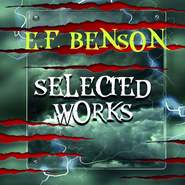По всем вопросам обращайтесь на: info@litportal.ru
(©) 2003-2025.
✖
The House of Defence. Volume 2
Настройки чтения
Размер шрифта
Высота строк
Поля
“But isn’t that inconsistent?” she said. “I don’t think a man whose whole belief was in health and life should go and kill things.”
“Oh yes; I think it’s inconsistent,” said Maud, “and so does he. But did you ever see anybody who wasn’t inconsistent? I never did, and I never want to. He would be so extremely dull: you would know all about him at once.”
“And you don’t know all about Mr. Cochrane?” she asked.
“No; I should like to know more. I think I never met anyone so arresting. You are forced to attend, whether you like it or not.”
“And I gather you like it?” asked Catherine.
“Yes, certainly. I like vigour and certainty, and – oh, well, that sort of cleanness. He is like a nice boy at Cambridge, with all this extraordinary strength behind.”
Catherine could not help making mental comments on this.
“Ah, that attracts you?” she said. “It attracts me also. I like people to be strong and efficient; but, oh, Maud, how one’s heart goes out to them when they are helpless and enmeshed in what is stronger than they!”
This was a clear change of subject. Mr. Cochrane was put aside for a little, and Catherine could not help noticing that Maud seemed relieved.
“Ah, you mean Thurso?” she said quickly, letting her book slide to the ground.
“Yes; and I want to talk to you about him, for I believe you are wise, and I feel helpless. I don’t know what to do. Last night, I must tell you, I went straight to his room after leaving you dressing. He had just taken laudanum, not because he had any headache, but because he longed for it.”
Maud clasped her hands together and gave a little pitiful sound, half sigh, half moan.
“Ah, the poor fellow!” she said. “Yes?”
“And – and he lied to me,” said Catherine, “and said he had not been taking it, and there was the glass smelling of it by his side. Then he was very angry with me for a little, and said I had spoiled everything, but eventually he gave me the bottle and let me pour it away. I did, and I threw the bottle into the shrubbery.”
Maud’s eye brightened.
“Ah! that’s better,” she said. “He can still fight it.”
Catherine shook her head.
“That’s not all,” she said, “and the rest is so dreadful, and so pathetic. I couldn’t sleep last night, and it must have been about two in the morning when I got out of bed and went to the window and sat there a little. And I saw Thurso come along the path, and he lit a match and found the bottle. Then he took it – it was bright moonlight; I could see quite clearly – and literally sucked it, to see if there was not a drop or two left.”
Maud had no reply to this. If it was despicable, it was, as Catherine had said, dreadfully pathetic.
“Advise me, dear Maud,” she said at length. “I am horribly troubled about it. The sight of him turning that damned little bottle – no, I’m not sorry: I meant it – upside down in his mouth showed me how awfully he wanted it. I feel one shouldn’t lose a day or a minute. The desire grows like an aloe-flower. But if he won’t see a doctor, what is to be done? I shall send for Sir James as soon as I get back to town, and tell him all about it; but I can’t force Thurso to see him. Besides – ” and she stopped.
“Yes?”
“There is nothing in the world so hard to cure,” she said. “It is deadlier than a cancer.”
“But he still wants to free himself,” said Maud.
“Yes; so does a prisoner.”
There was a pause.
“Or do you think I am taking too pessimistic a view?” asked Catherine.
Maud could not help seeing the bright side of things. Sunshine appealed to her more strongly than shadow. It was more real to her.
“Yes; I think you are,” she said. “He let you pour the – well, the damned stuff away. You influenced him more strongly than his desire.”
“Yes, than his satisfied desire,” said Catherine with terrible commonsense. “He had just taken it. Do you suppose he would have let me pour it away if he was just going to take it?”
“I don’t know. You are stronger than he, I think.”
Maud gave a great sigh, picking up her book.
“I remember Mr. Cochrane practically offered to cure his neuralgia,” she said, “but I knew it was perfectly useless to suggest it to Thurso; nor at the time did I believe in Mr. Cochrane. But since then – ”
Catherine looked up, and saw in Maud’s face what she had suspected.
“Oh, Maud!” she said. “Are you in love with him?”
Maud leaned forward, and her book again dropped face downwards on the gravel. She did not notice it.
“Oh, I haven’t the slightest idea,” she said. “Catherine, I do like him awfully – I like him most awfully. No one has ever attracted me like that. Good gracious! how indelicate I am! But I don’t care one straw. I should like to put all my affairs and all poor Thurso’s into his hands. I should do it with the utmost confidence, and I should then just curl round as one does in bed, and feel everything is all right. Is that being in love? I don’t know or care. He is so strong, and so windy and so sunny. He is surrounded by sun, and – and it is as if he had just had a cold bath and stepped into the sun. I love that strength and wind. Don’t you like it? I want somebody who would go on playing undoubled spades at bridge in the middle of an earthquake. He would – for a shilling a hundred. Am I in love with him? I tell you I don’t know. Certainly this sort of thing has never happened to me before, and, again, I certainly have never been in love. So perhaps ‘these are the ones.’ Oh, do tell me! When Thurso proposed to you, was it like that? Did you feel there wasn’t anybody else who really mattered? Oh dear! poor Mr. Cochrane, to have all this put upon him! He hasn’t shown the slightest sign of doing more than admire my fishing. Lots of people have done that. But about you and Thurso, did you feel that? Is that the one?”
There was a fine irony about this, and Catherine, in spite of the previous discussion on Christian Science, which laid down that all that had any real existence was good, felt disposed to believe in the malice that lurked in chance questions. She evaded the direct answer.
“Oh, there are as many ways of love as there are people in the world,” she said. “But, dear, I regard you with suspicion. There are certain symptoms – ”
“Oh, don’t,” said Maud.
“Very well. But I feel with you about strength. It is an adorable quality to women. And it is that which so troubles me about Thurso. I know – the throwing away of the bottle proves it – that he is fighting; but is he strong enough? He was weak when he allowed himself to form a habit that he knew was harmful.”
She threw her hands wide.
“Oh, it is so awful!” she said. “One begins by saying, ‘I shall do this when I choose,’ and so soon. This says, ‘You shall do it when I choose.’ Personally, I always make it a rule to give anything up before I begin to want it very badly.”
There was an irony in this, too. The remembrance of what chiefly kept her awake last night made her know that her rule was not always quite easy to follow. But this was secret from Maud.
“You, who get all you want!” she said, speaking from outside.
Catherine got up, and began walking up and down the small angle of lawn where they sat, bordering the deep flower-bed. All June was in flower there, just as in herself, to the outside view, all June seemed to be flowering. It was no wonder that Maud thought that. But all the emotional baggage which she had consistently thrown away all her life seemed to her to be coming back now in bales, returned to her by some dreadful dead-letter office – at least, she had hoped it was dead – and a sudden bitterness, born of perplexity, invaded her.
“Oh yes; everybody always thinks one is happy,” she said, “if one has good digestion and a passable appearance, and heaps of things to do, and the enjoyment in doing them which I have, and as much money as one wants. But all these things only give one pleasure. Do you think I am happy? Do you really think so?”
Maud dropped her eyes. When talk deepens it is well to talk in the dark, or to talk without the distraction of sight.
“No, I don’t think you are,” she said, “if I look deep down.”
“Then you are two people,” said Catherine rather fiercely – “the superficial Maud who just now said I had all I wanted, implying happiness, and another Maud, who has to be fished for.”
That was less personal, less intricate, and Maud looked up again, smiling.

















